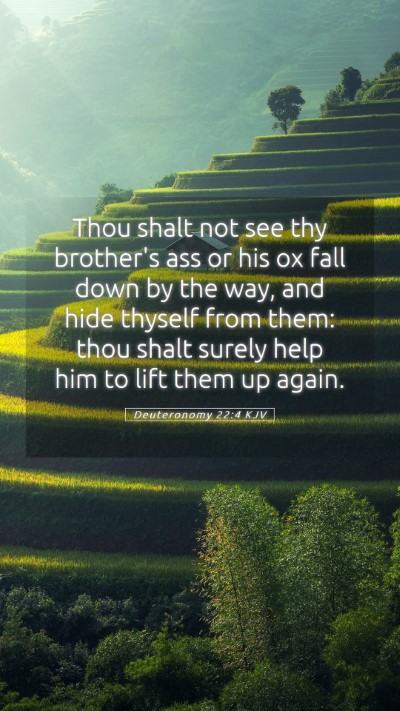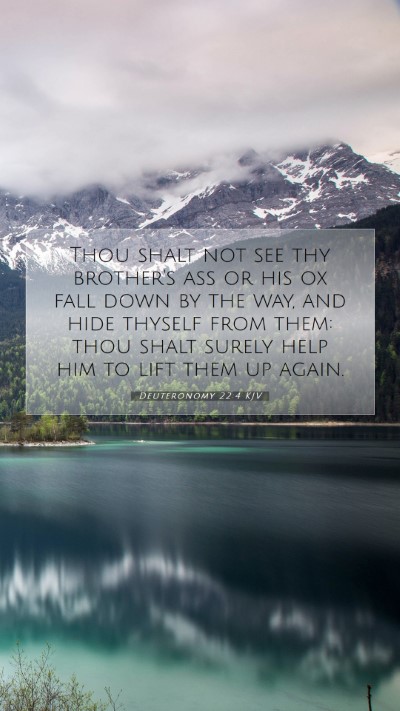Understanding Deuteronomy 22:4
Verse: "Thou shalt not see thy brother's ass or his ox fall down by the way, and hide thyself from them: thou shalt surely help him to lift them up again." (Deuteronomy 22:4)
Summary of Meaning: Deuteronomy 22:4 is a directive emphasizing the importance of compassion and assistance toward others, particularly in the context of community responsibility. The command illustrates a principle that goes beyond mere obligation; it embodies the spirit of love and care within the society.
Bible Verse Meanings
This verse is a clear exhortation for Israelites to actively help their neighbors in times of need. The term "brother" is significant as it indicates a bond that transcends mere acquaintance, pointing to the communal and familial ties that should characterize Israelite society.
Biblical Exegesis
From a biblical exegesis perspective, the verse articulates laws that are rooted in the fundamental ethical principles of the Mosaic Covenant. This reflects a divine expectation for the conduct of individuals within the community. By emphasizing active service ("thou shalt surely help him"), the text teaches that faith must be practical, manifesting itself in righteous actions.
Commentary Insights
- Matthew Henry: In his commentary, Henry notes that this command is not merely about the assistance of a laboring animal but serves as a moral lesson about our duties toward one another. He stresses that neglecting this duty equates to ignoring a moral imperative.
- Albert Barnes: Barnes emphasizes the relational aspect of duty here. He interprets the “brother” as a representation of fellow Israelites and suggests that this provision encourages community solidarity. He highlights that such help reflects God’s covenant love.
- Adam Clarke: Clarke elaborates on the broader implications of this verse, discussing that showing kindness to others in simple acts reinforces social and divine ties. He draws attention to the spiritual metaphor of helping those who have fallen, implying a theme of restoration and moral responsibility.
Application of Deuteronomy 22:4 in Daily Life
In application, this scripture calls for believers today to look beyond self-interest and to engage actively in the lives of others. It challenges individuals to consider how they can contribute to the well-being of their community and to provide tangible support to those in distress.
Bible Study Insights
This verse can provoke meaningful discussions in bible study groups about the nature of community and societal responsibilities. Through reflection, individuals might explore how they can embody the principles of love and care illustrated in this passage.
Cross References
- Exodus 23:4-5 - Emphasizes similar principles of helping an enemy's animal.
- Leviticus 19:18 - "Thou shalt love thy neighbor as thyself" reinforces the communal duty highlighted in Deuteronomy.
- Galatians 6:2 - "Bear ye one another's burdens" connects the Old Testament teaching with New Testament applications of community support and love.
Conclusion
In conclusion, Deuteronomy 22:4 serves as a profound reminder of our responsibilities to our neighbors, encouraging active participation in the welfare of others. Its implications resonate throughout Scripture, urging believers to apply these principles in their everyday lives, thereby enriching their understanding of both communal and divine dynamics.


